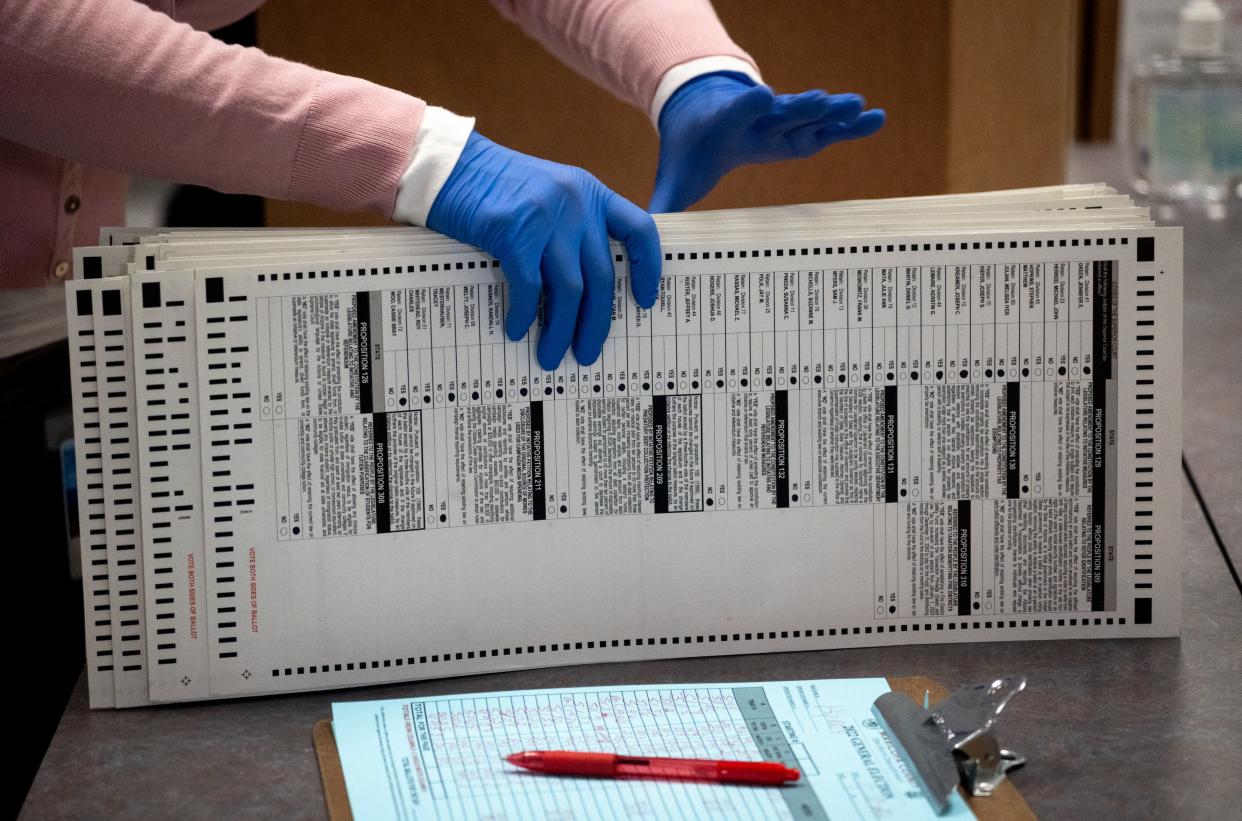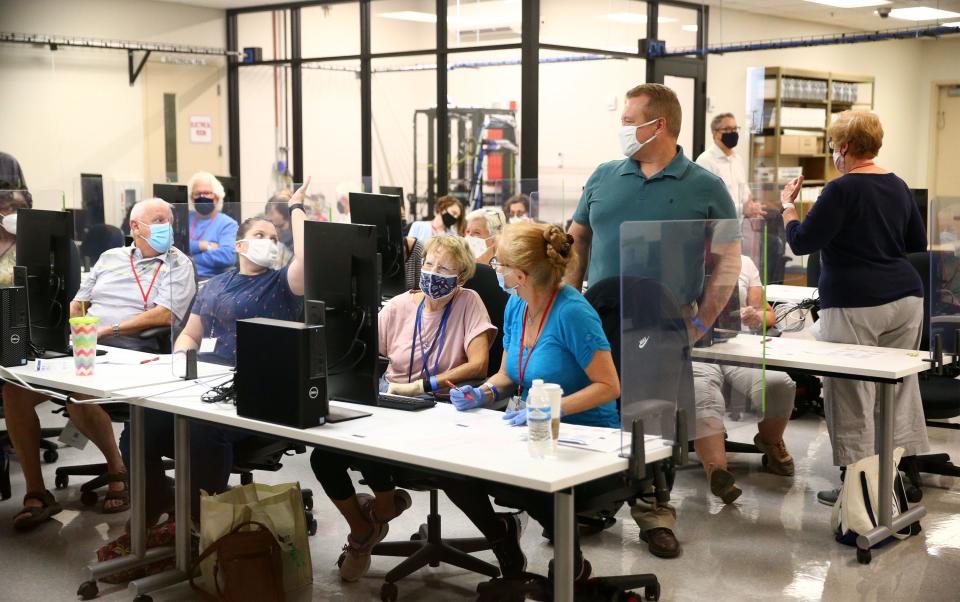Arizona elections can be fast, accurate or cheap. Which do voters want?

Does Arizona’s voting system need an overhaul or do voters need better understanding why the vote-counting takes too long – or both?
Doing nothing is not option.
Not after Arizona’s voting system took a couple of glaring stumbles in the 2022 election amid the national spotlight:
Machines to tabulate votes malfunctioned at up to 60% of polling places in Maricopa County for half of Election Day, leading to confusion and long lines.
Counting votes to declare winners in key races, with control of the U.S. Senate and the governor's office in the balance, took upwards of a week.
Neither involved manipulation or malice.
And neither prevented voters from casting a ballot or having their ballot counted.
The tabulation malfunction occurred because of improper settings that resulted in the machines’ inability to read the ballots. It appears to be a one-time, if widespread, anomaly that can be easily corrected at the county level.
The lengthy vote-count, however, is a feature of the system, not a bug.
Slow results were a black eye for Arizona
That long process of tallying votes served to erode confidence in the way Arizona conducts elections, and not just among the MAGA crowd that had begun its cries of election fraud two years earlier.
The criticism came from all sides.
The political blogger Mickey Kaus tweeted, “Arizona seems gratuitously slow counting ballots they already have in-hand. Is there any excuse?”
Can voters trust the election?Readers weigh in
National Review’s John Fund wrote of Arizona and Nevada, “Mail-in voting has turned Election Day into Election Month, and an increase in cynicism about elections has accompanied its rise. This cynicism only deepens our partisan animosity.”
An editorial two days after the election in the Wall Street Journal lamented, “As of Thursday afternoon, the ballots were only 83% counted in Nevada and 70% in Arizona ... These delays are a result of mass mail voting, and they’re no good for public confidence.“
Elections are secure, accurate and convenient

We agree.
Lengthy ballot tabulating, even if it is methodical and thoughtful, undermines everything else that Arizona does right on elections.
So what, if anything, should Arizona do to improve the system?
Maricopa County Recorder Stephen Richer believes the best way to secure faster results is to roll back some of the convenience voters now enjoy on when and where they can turn in early ballots. Whereas his predecessor, and now Arizona secretary of state, Adrian Fontes, believes the premise that the system needs fixing amounts to “the tail wagging the dog.”
Fontes maintains that the fundamentals are sound – that voting is secure, accurate and convenient – and that the system deserves defense from all quarters. “It’s about leadership,” he told The Arizona Republic’s editorial board.
Fontes is correct about Arizona’s voting system being secure, accurate and convenient.
Arizonans are afforded numerous options to vote. They can request an early ballot and mail it in weeks before the election. They can hold on to the ballot and drop it off up to the close of polling places on election night. They can vote in person days before the election or do so on Election Day.
Early ballots undergo a rigorous process of checks. The barcode on the return envelope is scanned to ensure the person is a registered voter who hasn’t already voted. The signature on the envelope is verified against the one on file, a verification that is then audited before a bipartisan team removes the ballot for inspection.
The nearly 300,000 early ballots in Maricopa County that were dropped off on Election Day meant that they could not be gathered, and the verification process begun until polls had closed. They were the chief cause of the bottleneck in the vote-tabulation process.
Arizona goes out of its way to determine questionable marks on ballots. Often, this occurs when there are multiple checks, or “overvotes,” in a particular race – and the entire ballot is withheld from tabulation until the bipartisan team can determine the voter’s intent. In Maricopa County alone, there are several hundred thousand such votes that get “adjudicated.”
Can we speed results without hurting the system?
All this access, convenience and accuracy – codified by law or policy – comes at the expense of fast results and declared winners.
Which may not have raised as much disdain and distrust a decade ago when there were fewer closely contested races. (They did occur. Remember Martha McSally’s Congressional District 2 win in 2014 by some 160 votes that triggered an automatic recount? Or her similarly tight loss two years earlier? There was no widespread outcry of fraud or manipulation.)
But our politics now are far more hyperpartisan and corrosive.
For many, access, convenience and accuracy no longer justify slow results.
So, where do we go from here?
Fast, accurate or cheap, but we can't have all 3
Richer believes the best compromise is to limit early ballot dropoff to the Friday afternoon before the election.
Doing that, he says, would allow 95% or more of the votes to be counted within 24 hours after the polls close. It was one of numerous reforms he outlined in a 28-page report to spur discussion.
Fontes puts it this way: “You can administer elections fast, accurate or cheap ... but you cannot do all three.”
He questions the wisdom of taking away a practice that 1 in 5 voters used in the November election and suggests that, if anything, lawmakers should invest the millions of dollars in staffing and equipment to quicken vote counting.
A few pieces of legislation have been introduced that go at the counting of votes:
House Bill 2096 would prohibit early ballot drop-offs after 5 p.m. on the Friday before the election, per Richer’s suggestion.
Senate Bill 1178 would deem any early ballot issued at any voting center to be ready for tabulating after the voter presents proper identification. Signature verification of the affidavit envelope would not be needed.
SB 1095 would add language on the envelope accompanying early ballots admonishing the voter, “Failure to mail an early ballot or deposit an early ballot in a ballot drop box by the Friday before the election will result in delayed election results.”
Any changes need bipartisan, public support
We are nowhere near ready to say where the solution lies.
We’re committed instead to spending the year further detailing our present election laws and practices, exploring the options to change the system and laying out the pros and cons of each to guide all of us forward.
Let us know your thoughts and ideas.
Because any change needs to be forged by bipartisan, public support.
The health of our elections – and the trust we place in the execution of them – depends on it.
This is an opinion of The Arizona Republic's editorial board.
This article originally appeared on Arizona Republic: Arizona elections can be fast, accurate or cheap. Which do we want?

